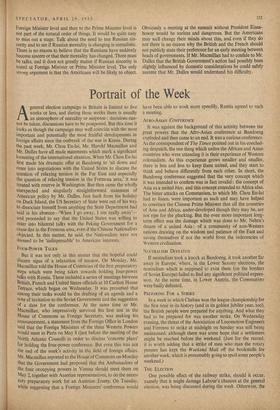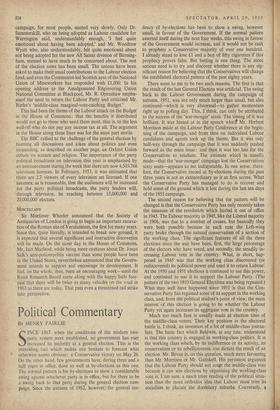Portrait of the Week
Ageneral election campaign in Britain is limited to five weeks or less, and during these weeks there is usually an atmosphere of unreality or suspense : decisions can- not be taken, discussions have to be postponed. But this time it looks as though the campaign may well coincide with the most important and potentially the most fruitful developments in foreign affairs since the outbreak of the war in Korea. During the past week, Mr. Chou En-lai. Mr. Harold Macmillan and Mr. Dulles have all made statements which mark a significant loosening of the international situation. When Mr. Chou En-lai first made his dramatic offer at Bandoeng to 'sit down and enter into negotiations with the United States to discuss, the question of relaxing tension in the Far East and- especially the question of relaxing tension in the Formosa area,' it was treated with reserve in Washington. But then came the wholly unexpected and singularly straightforward statement of American policy by Mr. Dulles. Just back from his holiday on Duck Island, the US Secretary of State went out of his way to dissociate himself from anythin the State Department had said in his absence—'When I go away, I am really away'— and proceeded to say that the United States was willing to enter into bilateral talks with the Peking Government for a cease-fire in the Formosa area, even if the Chinese Nationalists Objected. In this matter, he said, the Nationalists were not deemed to be 'indispensable' to American interests.
FOUR-PowER TALKS have been able to work more speedily, Russia agreed to such a meeting.
AFRO-ASIAN CONFERENCE • It was against the background of this activity between the great powers that the Afro-Asian conference at Bandoeng exploded and then came to an end. It was a curious conference. As the correspondent of The Times pointed out in his conclud- ing despatch, the one thing which unites the African and Asian countries who were attending it is their experience of Western colonialism. As this experience grows smaller and smaller. there is less and less to keep them united, and they start to think and behave differently from each other. In short, the Bandoeng conference suggested that the very concept which it was intended to confirm was in fact invalid : the concept of Asia as a united bloc, and this concept extended to Africa also. The bitter attacks on Communism, to which Mr. Chou En-lai had to listen, were important as such and may have helped to convince the Chinese Prime Minister that all the countries of Asia and Africa, under-developed though they may be, are not ripe for the plucking. But the even more important long- term effect was the damage which was one to Mr. Nehru's dream of a united Asia : of a community of non-Western nations drawing on the wisdom and patience of the East and saving themselves if not the world from the indecencies of Western civilisation.
NEUTRALISM DEFEATED If neutralism took a knock at Bandoeng, it took another far away in Europe, where, in the Lower Saxony elections, the neutralism which is supposed to exist there (on the borders of Soviet Europe) failed to find any significant political expres- sion. At the same time, in Lower Austria, the Communists were badly defeated.
PREPARING FOR A STRIKE In a week in which Chelsea won the league championship for the first time in its history (and in its golden jubilee year, too), the British people were prepared for anything. And what they had to he prepared for was another strike. On Wednesday evening, the threat of the Association of Locomotive Engineers and Firemen to strike at midnight on Sunday was still being maintained, although there was some hope that a settlement might be reached before the weekend. (Just for the record, it is worth adding that a strike of men who man the rotary presses has kept the Weekend Mail off the bookstalls for another week: which is presumably going to spoil some people's weekend.) campaign, for most people, started very slowly.. Only Dr. Summerskill, who on being adopted as Labour candidate for Warrington said, understandably enough, 'I feel quite emotional about having been adopted,' and Mr. Woodrow Wyatt who, also understandably, felt quite emotional about not being adopted for the new All Saints division of Birming- ham, seemed to have much to be concerned about. The rest of the election news has been small. The unions have been asked to make their usual contributions to the Labour election fund, and even the Communist-led Scottish area of the National Union of Mineworkers has responded with £1,000. In his opening address to the Amalgamated Engineering Union National Committee at Blackpool, Mr. R. Openshaw empha- sised the need to return the Labour Party and criticised Mr.
Butler's 'middle-class marginal-vote-catching Budget.'
This had been the theme of the Labour attack on the Budget in the House of Commons : that the benefits it distributed would not go to those who need them most, that is, to the less well-otr who do not pay any income tax at all. The argument in the House along these lines was for the most part sterile.
The BBC rallied to the challenge of the general election by banning all discussions and jokes about politics and even suspending, as described on another page, an Oxford Union debate on science and religion. The importance of the party political broadcasts on television this year is emphasised by an announcement during the week that there are now 4,503,766 television licences. In February, 1953, it was estimated that there are 2.7 viewers of every television set licensed. If one assumes, as is reasonable, that the audiences will be increased for the party political broadcasts, the party leaders will, through television, be reaching between 15,000,000 and 20,000,000 electors.
MISCELLANY
Sir Mortimer Wheeler announced that the Society of Antiquaries of London is going to begin an important excava- tion of the Roman site of Yerulamium, the first for many years. Since this, quite literally, is intended to break new ground, h is expected that several significant and instructive discoveries will be made. On the same day in the House of Commons, Mr. lain Macleod, while being more cautious about Dr. Jonas Salk's anti-poliomyelitis vaccine than some people have been in the United States, nevertheless announced that the Govern- ment intends to support and encourage its development. It had. on the whole, then, been an encouraging week—until the Road Research Board came along with the happy little fore- cast that there will be twice as many vehicles on the road in 1963 as there are today. That puts even a threatened rail strike into perspective.



















































 Previous page
Previous page